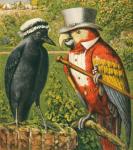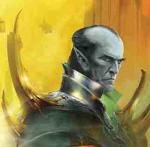Posted 23 April 2012 - 09:48 PM
I remember, some time ago, watching TV programmes that explored the racial makeup of the Roman Empire and being deeply influenced by the discovery that it was a very multi-racial, multi-cultural Empire that was suprisingly tolerant. Even last week a series exploring this again began on BBC2 (and iirc, another on BBC3) uncovering the vast mix of people who became Roman Citizens. Indeed, it seems that in its later life very few Romans were born and bred in Italy. I envisioned this widespread Empire of many diverse races and cultures where ex-slaves and other 'races' could, through work, merit and connections, rise high in society. It was the idea of what the Empire representated that was all important. Many historians, for example, believe Cleopatra was a black african, which did not perturn either Ceasar or Marc Anthony. There was resentment because she was not Roman, not, it seems, because of her race and colour. In fact, as far as I know, the colour of a man's (or woman's) skin never really mattered to the Romans at all and they had a number of non-Italian Emperors.
My point, is that whilst a large body of Fantasy Works based on the Medieval-European model would, by necessity, be pre-dominantly about white races and cultures, there exists fantasy work that does not. In fact, imho, if a writer chose to write an epic work based on the Euro-Medieval model and made the races predominantly black or asian I think they'd run the risk of that issue becoming the central talking point about their work, rather than the story. Perhaps some writers would welcome this but I know that I write because I want to tell great stories with a host of characters, exploring issues that interest me - but I want to be judged on the merit of my work, not on whether or not I am challenging convention and tackling mighty issues. Fantasy and fiction is about escapism, plain and simple. Suspension of disbelief and wonderous things. Take Robert Howard who, quite in defiance of the complexities of the world around him, wrote magnificent stories of a far simpler life and existence - there is a reason Conan often ended the story with just his sword, his wits and a few coins to go on. Yet he was strapping white warrior who often battled the dark-skinned savages of the south.
There is room for all types of characters and stories and heroes but I really do not believe that it is the duty of the fantasy writer to try and balance modern issues in their work - it's fantasy! It should have a recognisable core for the reader and then lots of exotic peoples and adventures around it. In my own work I have centred the second book around an Empire based loosely on the Rome I first mentioned, but only in the exotic make up of the people - the soldiers are from many lands, bolstered by far flung mercenaries. The third book is of Merchant Republic of sea-farers and conquerers further south and they are pre-dominantly black. But none of this is important beyond allowing me to populate the world with a wide mix of peoples and explore how their cultures and their religious beliefs conflict. I am not trying to rebalance the scales because that's not my job.
Martin has written a terrific and diverse world based on the Euro-Medieval model, but the creation of the mongol-like Dothraki (which he has given a fairly rich heritage, imho) and the dark skinned people who do not live in Westeros is fine by me. In writing epic fantasy you really need to create cultures and races that are different, based upon where they live, where they came from, the geography of their lands, the climate, history, migrations and so on. You just can't have westeros pre-dominantly dark-skinned unless you move it geographically (in which case the whole Wall and Winter thing can't happen) or there is some very good historical reason for it. The one way he could have done this would be to make the Targaryen's black but I suspect he would have been accused by some of racism if he had.
Personally I think the Euro-Medieval model has been done to death and there are many interesting cultures to explore and bend and play with for the writer. Having said that, my northern nations are not wholly free of the influence because you want to have some recognisable elements for the reader, thus, I have Kings and Knights (though they are a bit different) and castles and civil war where soldiers wear armour and hack at one another with swords and axes. And, due to the geography and climate, they are pre-dominantly white. I see nothing wrong with that.
Victory is mine!
 the broken, on 10 April 2012 - 08:41 PM, said:
the broken, on 10 April 2012 - 08:41 PM, said:
 Help
Help





















